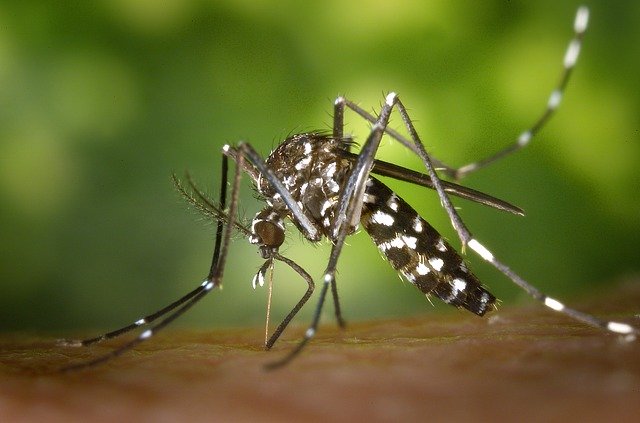Mosquitoes are vectors for diseases caused by parasites, bacteria, and viruses. There are many different diseases caused by mosquitoes, but here are the most common diseases mosquitoes transmit:
Diseases Mosquitoes Transmit
Malaria
A disease that has been proven deadly, especially in third-world countries, is caused by parasites of the Plasmodium genus. The Anopheles mosquito transmits malaria.
Malaria symptoms mimic the flu, encompassing fever, chills, headaches, muscle aches, abdominal pain, fatigue, and nausea. If you suspect exposure to malaria, it’s crucial to inform your healthcare provider promptly for testing.
Mosquitoes contract malaria by biting an infected individual, subsequently transmitting the parasite to another person’s bloodstream upon biting them.
Dengue Fever
Dengue outbreaks have been reported in the United States, particularly in areas where Aedes mosquitoes, the carriers of the virus, are prevalent. Dengue symptoms may include fever, severe headache, bleeding, joint and muscle pain, and rash.
Annually, approximately 390 million individuals contract dengue fever. Outbreaks have been documented across various regions, including Southeast Asia, the Western Pacific, the Eastern Mediterranean, the Americas, the Caribbean, and Africa. Forty percent of the global population resides in regions vulnerable to dengue transmission.
Zika Virus
Also transmitted by the Aedes mosquito, the Zika virus can cause birth defects, including microcephaly. The virus has recently surfaced in North America among travelers returning from regions where the virus is prevalent.
The primary transmission mode is through the bite of infected female Aedes mosquitoes. Additionally, documented modes of transmission include blood transfusion, sexual contact, and, albeit rare, transmission from mother to child.
The majority of individuals infected with Zika experience very mild or no symptoms at all, often leading to unawareness of the infection.
West Nile Virus
Infected mosquitoes of the Culex species, primarily mosquitoes, transmit this virus. Most infected with West Nile Virus experience no symptoms. Still, some develop a fever, headache, body aches, vomiting, diarrhea, or rash.
The first documented cases of West Nile infections, originating from the West Nile virus (WNV), were identified in New York City in 1999. Since then, West Nile infections have become the most commonly reported mosquito-borne disease to the CDC in the United States, with nearly 3,000 cases reported in 2005. While many individuals infected may exhibit no or very mild symptoms, about 20% may experience flu-like symptoms.
However, severe illness and even death can occur in humans, with a fatality rate ranging from 3% to 15% among diagnosed cases with clinical disease.
Chikungunya
Among many of the diseases mosquitoes transmit, Chikungunya is a viral disease transmitted by the Aedes mosquitoes. Symptoms include fever, joint pain, muscle pain, headache, nausea, fatigue, and rash.
Yellow Fever
A viral disease transmitted by infected Aedes or Haemagogus mosquitoes. Symptoms include fever, chills, headache, backache, muscle aches, loss of appetite, and nausea or vomiting. In severe cases, it can lead to jaundice, bleeding, and organ failure.
Japanese Encephalitis
Also among many of the diseases mosquitoes transmit, Japanese Encephalitis is a viral infection transmitted by Culex mosquitoes, primarily in rural agricultural areas of Asia. It can cause brain inflammation (encephalitis) with symptoms like headache, fever, confusion, and seizures.
Saint Louis Encephalitis
The discovery of the cause of St. Louis Encephalitis (SLE) dates back to 1933. Between 1964 and 1998, the United States documented 4,478 cases of SLE. Similar to West Nile Virus (WNV), SLE is transmitted by Culex mosquitoes.
While the majority of SLE infections are asymptomatic and go undetected, the virus can lead to severe illness and even death in humans, particularly affecting the elderly, with a fatality rate ranging from 3% to 30%. Children are typically less prone to severe illness, though cases of encephalitis are relatively high among those affected. Unlike WNV, SLE does not threaten horses, as it does not cause disease in equines.
Preventing Diseases Spread by Mosquitoes
Taking preventive actions in order to prevent diseases mosquitoes transmit include using insect repellent, covering exposed skin with long sleeves and pants, and removing stagnant water where mosquitoes breed can reduce the chances of contracting mosquito-borne illnesses.
Related: Learn more about how to prevent mosquitoes.
For more information:
- Mosquito-Bourne Diseases – Baylor College of Medicine, Department of Molecular Virology and Microbiology, lists several diseases mosquitoes transmit.
- Mosquito-borne disease prevention – Learn simple steps to protect yourself and your family from mosquito bites and the illnesses they cause – Mass.gov.
- Is that mosquito bite cause for concern? – Ohio State University.
- Diseases – Mosquitoes – Purdue University, lists several diseases mosquitoes transmit.
- Dengue – CDC

